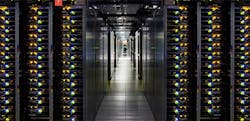Google Plans New SubSea Cable, Plus Data Center in Phoenix
Over the last three years, Google has invested $47 billion in its global infrastructure. That effort continues this week with the announcement of a new subsea cable and the revelation of another cloud campus in a key data center market.
Google said today that it will build a new private subsea cable that will connect Africa with Europe. The Equiano cable will start in western Europe and run along the West Coast of Africa, between Portugal and South Africa, with branching units along the way that can be used to extend connectivity to additional African countries.
Meanwhile, Google is pursuing plans to build a new data center campus in Mesa, Arizona, a suburb of Phoenix that has emerged as a major hub for data centers and cloud computing. The company has negotiated a tax incentive package for a 186-acre site in the Elliot Road Technology Corridor, near existing facilities for Apple and EdgeCore.
Google’s growth reflects two trends we’ve been closely tracking here at Data Center Frontier:
- Hyperscale computing players are reshaping how data flows around the world, rerouting undersea lanes to target new markets and bring traffic ashore near their giant data center campuses. This trend is creating new locations for cable landing stations, which have historically been key points in how data center geography and Internet traffic flows.
- More huge data centers are coming to the suburbs of major American cities, shifting servers closer to consumers in places like Dallas, Chicago, Atlanta and Phoenix. The shift has been gradual thus far, but will gain momentum in coming years. It’s part of a gradual shift in architecture as cloud computing adapts to serving larger audiences and real-time applications.
Equiano: A Massive Data Pipe to Africa
The Equiano project is just one of series of investments in new undersea cables by Google and its cloud rivals. But it has major significance in the development of the digital economy in Africa, signaling that the largest Internet players are ready to invest in infrastructure to support the continent.
The new cable is fully-funded by Google and will be dedicated to the company’s business. Google said it will also work with partners to bring Equiano’s capacity to more countries across the African continent. The first phase of the project, connecting South Africa with Portugal, is expected to be completed in 2021.
The route of Google’s new Equiano subsea cable connecting Europe and Africa. (Image: Google)
Because of the huge cost of subsea cables, they are usually built by consortiums of telecom companies and end users, as is the case with the MAREA cable, which also lands in Virginia Beach and includes Telefonica, Microsoft and Facebook as investors. After partnering on several of its early cable initiatives, Google changed course with recent projects, including Curie (which connects the West Coast and Google’s South American data center campus in Chile) and the Dunant trans-Atlantic cable, which provides a high-bandwidth path for Internet traffic from France to Virginia Beach, supporting Google’s data center growth in Northern Virginia.
Google didn’t mention any future infrastructure projects, but its previous cable projects have been strategic in creating data flows to its data center campuses. The Equiano project suggests that Google is paying the groundwork for an expanded data center infrastructure in Africa.
The project is also notable for its technology, which like Dunant uses space-division multiplexing (SDM) in place of wave division multiplexing, which increases cable capacity with additional fiber pairs and power-optimized repeater design.
“Equiano will be the first subsea cable to incorporate optical switching at the fiber-pair level, rather than the traditional approach of wavelength-level switching,” the company said. “This greatly simplifies the allocation of cable capacity, giving us the flexibility to add and reallocate it in different locations as needed.”
Mesa Project Boosts Phoenix Cloud Boom
Google’s plans in Mesa were revealed in news coverage from the East Valley Tribune, which reports that the incentive package for Google is expected to be approved in a Monday city council meeting.
“In terms of a financial deal, this is home run,” Mesa Mayor John Giles said. “This is a great day.’”
Giles noted that the Elliot Road Technology Corridor will be anchored by Apple at one end and Google at the other. There’s plenty of data center development planned in between, including a new project from EdgeCore Internet Real Estate . Companies that have purchased land in the corridor include Digital Realty, CyrusOne and EdgeConneX, while several others are said to be shopping sites.
The Apple data center in Mesa, Arizona. (Photo: Rich Miller)
Google’s project builds on the data center building boom in Phoenix, is drawing some of the biggest names in hyperscale computing. The Phoenix data center market is home to hundreds of megawatts of potential data center capacity, and demand is growing. The region now has more than 1 gigawatt of data center capacity in the pipeline.
Mesa and nearby Chandler, Ariz., have become quality sub-markets, notable for lower electricity and real estate costs. Chandler, which has been a focal point for hyperscale development in the Phoenix market, housing campuses for CyrusOne, Digital Realty and H5 Data Centers.
There’s also plenty of development action to the West of Phoenix, where the small town of Goodyear has emerged as a data center destination. Microsoft recently bought land in Goodyear for a major cloud availability zone, while Compass Datacenters, Stream Data Centers and Vantage Data Centers have all bought property in Goodyear for future campuses.
About the Author



